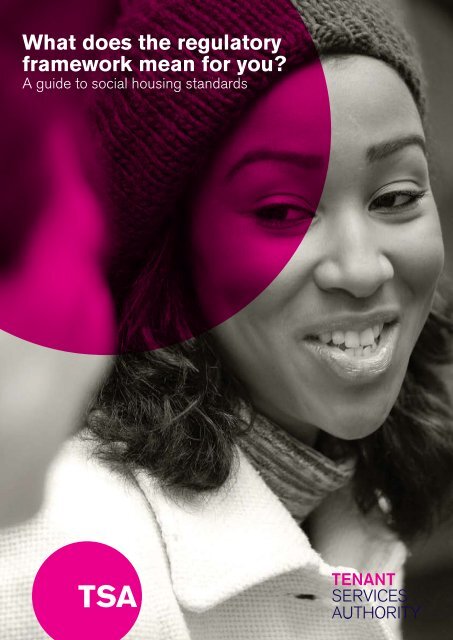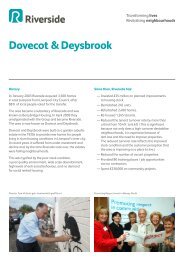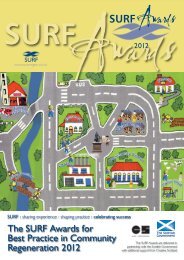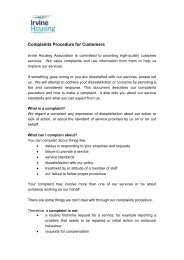What does the regulatory framework mean for you? - Riverside
What does the regulatory framework mean for you? - Riverside
What does the regulatory framework mean for you? - Riverside
Create successful ePaper yourself
Turn your PDF publications into a flip-book with our unique Google optimized e-Paper software.
<strong>What</strong> <strong>does</strong> <strong>the</strong> <strong>regulatory</strong><br />
<strong>framework</strong> <strong>mean</strong> <strong>for</strong> <strong>you</strong>?<br />
A guide to social housing standards<br />
<strong>What</strong> <strong>does</strong> <strong>the</strong> <strong>regulatory</strong> <strong>framework</strong> <strong>mean</strong> <strong>for</strong> <strong>you</strong>? 1
Contents<br />
Introduction 1<br />
<strong>What</strong> is co-regulation? 2<br />
<strong>What</strong> <strong>does</strong> this <strong>mean</strong> <strong>for</strong> local priorities? 3<br />
<strong>What</strong> standards must landlords meet? 5<br />
Tenant involvement and empowerment standard 6<br />
Home standard 8<br />
Tenancy standard 10<br />
Neighbourhood and community standard 12<br />
Value <strong>for</strong> money standard 14<br />
Governance and financial viability standard 16<br />
How can tenants make a complaint? 18<br />
April 2010
Introduction<br />
We are <strong>the</strong> regulator <strong>for</strong> social housing in England.<br />
Our new powers came into effect <strong>for</strong> all social<br />
housing providers from 1 April 2010. For <strong>the</strong> first<br />
time, every social housing tenant in England now<br />
benefits from a common set of standards that<br />
applies to all providers whe<strong>the</strong>r <strong>the</strong>y are a local<br />
authority, a housing association or o<strong>the</strong>r <strong>for</strong>m of<br />
provider.<br />
Our standards and approach to regulation are<br />
fundamental to us and are aimed at:<br />
• ensuring a fair deal <strong>for</strong> tenants – who cannot in<br />
most cases simply vote with <strong>the</strong>ir feet and move<br />
to ano<strong>the</strong>r provider if services are poor<br />
• protecting taxpayers and o<strong>the</strong>r funders of social<br />
housing – by continuing our work on sector<br />
governance and financial viability to safeguard<br />
and maximise <strong>the</strong> value from public investment<br />
and promote private investment in new and<br />
existing homes<br />
• being a modern and effective regulator – a<br />
consumer-focused regulator that is efficient,<br />
accountable, proportionate and transparent in<br />
its approach<br />
Achieving lasting service delivery improvement will<br />
involve providers working with <strong>the</strong>ir tenants and<br />
holding <strong>the</strong>mselves open to scrutiny by <strong>the</strong>m. We<br />
set out how we expect providers, at <strong>the</strong> local level,<br />
to develop <strong>the</strong>ir service offer in response to local<br />
priorities and to work with o<strong>the</strong>r partners in <strong>the</strong>ir<br />
neighbourhood to improve <strong>the</strong> quality of life <strong>for</strong> all<br />
residents.<br />
In this guide we set out <strong>the</strong> six standards that<br />
apply to all social housing landlords. The standards<br />
describe <strong>the</strong> outcomes we want to see achieved<br />
and some specific expectations all providers must<br />
comply with. We have consciously given providers<br />
and <strong>the</strong>ir tenants <strong>the</strong> freedom to define what<br />
‘local’ <strong>mean</strong>s to <strong>the</strong>m. We expect providers to tailor<br />
<strong>the</strong>ir service offer and to set out clearly to <strong>the</strong>ir<br />
tenants how <strong>the</strong>y will meet all of <strong>the</strong> TSA standards,<br />
whe<strong>the</strong>r <strong>the</strong>y are locally tailored or not. Most<br />
importantly, we expect providers to involve <strong>the</strong>ir<br />
tenants in <strong>the</strong> design of <strong>the</strong>ir services and to deliver<br />
on <strong>the</strong>ir promises.<br />
We know that where per<strong>for</strong>mance is poor or<br />
involvement is weak, this can have a significant<br />
negative effect on tenants’ lives. Where this is <strong>the</strong><br />
case, we will expect speedy self-improvement and<br />
where this is insufficient, we have a new graduated<br />
range of en<strong>for</strong>cement powers to ensure that<br />
tenants get a fair deal.<br />
This summary booklet sets out our standards, <strong>the</strong><br />
required outcomes and some of <strong>the</strong> things tenants<br />
can expect as <strong>the</strong>ir landlord works to meet <strong>the</strong>m. It<br />
also explains <strong>the</strong> procedure tenants should follow<br />
if <strong>the</strong>y wish to complain about service delivery by<br />
<strong>the</strong>ir landlord, as well as <strong>the</strong> respective roles of <strong>the</strong><br />
landlord, <strong>the</strong> ombudsmen and <strong>the</strong> TSA.<br />
Peter Marsh<br />
Chief Executive<br />
<strong>What</strong> <strong>does</strong> <strong>the</strong> <strong>regulatory</strong> <strong>framework</strong> <strong>mean</strong> <strong>for</strong> <strong>you</strong>? 1
<strong>What</strong> is co-regulation?<br />
Our approach to social housing regulation is built<br />
around what’s called ‘co-regulation’. By that, we<br />
<strong>mean</strong> that we set clear outcome-focused standards<br />
<strong>for</strong> providers and we expect robust self-regulation<br />
by <strong>the</strong> boards and councillors who govern <strong>the</strong><br />
delivery of housing services in order to meet those<br />
standards. This must incorporate effective tenant<br />
involvement and scrutiny and be subject to a<br />
‘backbone’ of regulation by <strong>the</strong> TSA.<br />
Providers need to ensure <strong>for</strong> <strong>the</strong>ir tenants that <strong>the</strong>y<br />
are meeting <strong>the</strong> obligations contained within our six<br />
standards. These have been shaped by our National<br />
Conversation that helped us establish tenants’<br />
priorities. They also have <strong>the</strong> support of providers<br />
and those that invest in social housing.<br />
Our standards emphasise that providers need to<br />
involve <strong>the</strong>ir tenants in shaping how services are<br />
delivered. Only by doing this can <strong>the</strong>ir work meet<br />
local priorities. Our standards also involve tenants<br />
being able to scrutinise per<strong>for</strong>mance. Discussions<br />
about service delivery and improvement should be<br />
between providers and <strong>the</strong>ir tenants, ra<strong>the</strong>r than<br />
between <strong>the</strong> regulator and <strong>the</strong> provider, but we<br />
reserve <strong>the</strong> right to step in when <strong>the</strong>se fail.<br />
Responsibility <strong>for</strong> meeting <strong>the</strong>se standards lies with<br />
<strong>the</strong> boards and councillors that govern providers’<br />
service delivery. And <strong>for</strong> co-regulation to work,<br />
landlords must assess <strong>the</strong>ir per<strong>for</strong>mance honestly,<br />
robustly and using evidence. They should use<br />
external validation, independent audit and peer<br />
review, where appropriate, and enable tenants to<br />
scrutinise this process.<br />
By October each year, providers must report<br />
per<strong>for</strong>mance against all <strong>the</strong> standards to <strong>the</strong>ir<br />
tenants. This will help to streng<strong>the</strong>n <strong>the</strong>ir<br />
accountability, and tenants will be involved in<br />
developing and scrutinising this report.<br />
Tenants should be able to monitor and scrutinise<br />
<strong>the</strong>ir landlord’s per<strong>for</strong>mance against <strong>the</strong> standards.<br />
Providers should also support tenants to build <strong>the</strong>ir<br />
capacity to make co-regulation effective.<br />
Tenants who are not happy with <strong>the</strong>ir provider’s<br />
service or approach to co-regulation can make a<br />
complaint to <strong>the</strong> provider. Our standards require<br />
providers to have a clear and accessible complaints<br />
policy so tenants know how <strong>the</strong>y can raise concerns<br />
and have <strong>the</strong>m dealt with fairly and promptly. If<br />
a tenant remains dissatisfied after complaining<br />
to <strong>the</strong>ir provider, <strong>the</strong>y have <strong>the</strong> right to raise <strong>the</strong>ir<br />
concern with <strong>the</strong> relevant housing ombudsman.<br />
The TSA <strong>does</strong>n’t deal with complaints related to<br />
service failure (as this is <strong>the</strong> role of <strong>the</strong> provider<br />
and relevant ombudsman). But where tenants or<br />
<strong>the</strong> ombudsmen have grounds to suspect that a<br />
provider has problems rooted in <strong>the</strong>ir procedures<br />
which <strong>mean</strong>s <strong>the</strong>y have difficulty complying with<br />
any of our <strong>regulatory</strong> standards, or <strong>the</strong>y have o<strong>the</strong>r<br />
issues of <strong>regulatory</strong> concern, <strong>the</strong>y can raise <strong>the</strong>se<br />
with <strong>the</strong> TSA. We will <strong>the</strong>n consider whe<strong>the</strong>r to<br />
pursue this with <strong>the</strong> provider.<br />
Our approach to co-regulation extends to <strong>the</strong><br />
development and review of <strong>regulatory</strong> policy and<br />
how we regulate in practice.<br />
2
<strong>What</strong> <strong>does</strong> this <strong>mean</strong> <strong>for</strong> local priorities?<br />
Providers set out <strong>the</strong>ir offer to <strong>the</strong>ir<br />
tenants and deliver it<br />
There is a requirement in five of our standards<br />
(those relating to service delivery) <strong>for</strong> each provider<br />
to set out in an annual report <strong>for</strong> <strong>the</strong>ir tenants how<br />
<strong>the</strong>ir service offer meets <strong>the</strong>ir obligations <strong>for</strong> each<br />
of <strong>the</strong> TSA’s standards and any improvements<br />
planned <strong>for</strong> tenants over <strong>the</strong> next year. Providers<br />
are expected to deliver on <strong>the</strong>se commitments and<br />
be accountable <strong>for</strong> <strong>the</strong>ir compliance with all <strong>the</strong><br />
standards in all areas where <strong>the</strong>y operate. There<br />
is a requirement that tenants are involved in <strong>the</strong><br />
preparation and scrutiny of <strong>the</strong>ir provider’s annual<br />
report and that providers set out in <strong>the</strong>ir reports how<br />
this has been achieved.<br />
A clear timetable <strong>for</strong> making offers<br />
and reporting per<strong>for</strong>mance to tenants<br />
An annual report <strong>for</strong> each year ending 31 March<br />
should be made available to tenants by no later<br />
than 1 October. We have established high-level<br />
expectations <strong>for</strong> <strong>the</strong> contents of <strong>the</strong>se reports.<br />
For <strong>the</strong> first report in October 2010, we expect<br />
providers to set out <strong>the</strong>ir plans <strong>for</strong> developing local<br />
offers. We would be prepared to accept limited<br />
extensions to this date in <strong>the</strong> first year only, where<br />
<strong>the</strong> provider can demonstrate this is reasonable and<br />
has advised its tenants and us in advance.<br />
Local offers <strong>for</strong> service delivery should be in place<br />
by 1 April 2011.<br />
Meaningful engagement with tenants<br />
The Tenant Involvement and Empowerment<br />
Standard requires all providers to offer <strong>the</strong>ir tenants<br />
opportunities to agree how some services can be<br />
tailored to meet <strong>the</strong>ir local priorities. Where tenants<br />
want local tailoring and choices to reflect <strong>the</strong>ir<br />
priorities, <strong>the</strong> provider should consult <strong>mean</strong>ingfully<br />
with <strong>the</strong>ir tenants and act reasonably to develop<br />
a local offer in response. Our expectation is that<br />
in most cases providers will reach agreement with<br />
<strong>the</strong>ir tenants on <strong>the</strong>se local offers. Providers should<br />
take into account, and discuss with <strong>the</strong>ir tenants,<br />
<strong>the</strong>ir obligations to <strong>the</strong> o<strong>the</strong>r standards, including<br />
<strong>the</strong> Value <strong>for</strong> Money Standard.<br />
The TSA cannot compel ‘agreement’ of local offers<br />
because we cannot regulate <strong>for</strong> <strong>the</strong> degree of<br />
acceptance by tenants. Where agreement cannot<br />
be reached, we encourage <strong>the</strong> providers and <strong>the</strong>ir<br />
tenants to seek independent mediation.<br />
Providers and tenants discuss<br />
appropriate arrangements, within a<br />
broad <strong>framework</strong> set by <strong>the</strong> TSA<br />
The content of local offers is a matter <strong>for</strong> providers<br />
to agree in consultation with <strong>the</strong>ir tenants.<br />
We expect discussions to cover a number of<br />
areas related to <strong>the</strong> TSA standards: specifically<br />
those related to <strong>the</strong> Tenant Involvement and<br />
Empowerment, Home and Neighbourhood and<br />
Community Standards. There is a requirement in <strong>the</strong><br />
<strong>What</strong> <strong>does</strong> <strong>the</strong> <strong>regulatory</strong> <strong>framework</strong> <strong>mean</strong> <strong>for</strong> <strong>you</strong>? 3
Tenant Involvement and Empowerment Standard <strong>for</strong><br />
providers, in offering opportunities <strong>for</strong> <strong>the</strong>ir tenants<br />
to agree local offers, to take into account:<br />
• standards of per<strong>for</strong>mance offered to tenants<br />
• how per<strong>for</strong>mance will be monitored, reported to<br />
and scrutinised by tenants<br />
• what happens if local offers, having been<br />
agreed with tenants, are not met, which may<br />
include redress <strong>for</strong> tenants<br />
• <strong>the</strong> arrangements <strong>for</strong> reviewing local offers on<br />
a periodic basis<br />
There is also a requirement within <strong>the</strong> Tenant<br />
Involvement and Empowerment Standard <strong>for</strong><br />
providers to say how <strong>the</strong>y will provide support<br />
to build tenants’ capacity so <strong>the</strong>y are effectively<br />
engaged and involved.<br />
The definition of what is ‘local’ is <strong>for</strong><br />
providers and <strong>the</strong>ir tenants<br />
It is not <strong>for</strong> <strong>the</strong> TSA to define this, but we expect<br />
providers to consider <strong>the</strong>ir obligations under <strong>the</strong><br />
Neighbourhood and Community Standard in<br />
relation to local area co-operation, which requires<br />
<strong>mean</strong>ingful co-operation with Local Strategic<br />
Partnerships and <strong>the</strong> strategic housing function<br />
of local authorities. Providers should <strong>the</strong>re<strong>for</strong>e<br />
consider whe<strong>the</strong>r services to <strong>the</strong> tenants could be<br />
improved by participating in an area-based offer. In<br />
<strong>the</strong>se cases it may be reasonable <strong>for</strong> a provider to<br />
define ‘local’ as <strong>the</strong> local authority area or a subset<br />
of it, such as a neighbourhood or estate. Providers<br />
are not under a <strong>regulatory</strong> obligation to agree local<br />
offers with local authorities. We recognise that<br />
some providers may want to tailor <strong>the</strong>ir services by<br />
factors o<strong>the</strong>r than geography, such as in relation to<br />
demographics (eg older tenants). Some providers<br />
may also, having properly involved and consulted<br />
<strong>the</strong>ir tenants, decide not to have a local offer where<br />
tenants expressly do not want one.<br />
<strong>What</strong> happens if <strong>the</strong>re is a failure to<br />
deliver on commitments made in an<br />
agreed local offer?<br />
We want co-regulation between providers and<br />
tenants to work to resolve <strong>the</strong> issue. In doing so, we<br />
expect <strong>the</strong> provider to comply with its own scrutiny<br />
and redress provisions that it has agreed with its<br />
tenants. We also expect providers to take ownership<br />
<strong>for</strong> <strong>the</strong>ir self-improvement in such circumstances.<br />
Only in exceptional cases (such as when <strong>the</strong><br />
provider is not delivering services in line with <strong>the</strong><br />
outcomes set out in <strong>the</strong> TSA standards and has<br />
failed to address this) and where it is reasonable<br />
and proportionate will <strong>the</strong> TSA consider more <strong>for</strong>mal<br />
intervention.<br />
4
<strong>What</strong> standards must landlords meet?<br />
There are six standards that landlords must meet.<br />
They are:<br />
• tenant involvement and empowerment – this<br />
includes requirements relating to customer<br />
service, choice and complaints, involvement<br />
and empowerment, and understanding and<br />
responding to diverse needs of tenants<br />
• home – this includes requirements relating<br />
to quality of accommodation and repairs and<br />
maintenance<br />
• tenancy – this includes requirements relating to<br />
allocations, rents* and tenure<br />
• neighbourhood and community – this includes<br />
requirements relating to neighbourhood<br />
management, local area co-operation and<br />
anti-social behaviour<br />
• value <strong>for</strong> money<br />
• governance and financial viability*<br />
These standards are central to our <strong>regulatory</strong><br />
<strong>framework</strong>. They describe <strong>the</strong> outcomes we want<br />
to see delivered and some specific expectations we<br />
expect social housing landlords to meet in delivering<br />
<strong>the</strong>se outcomes. Please refer to our full document,<br />
The Regulatory Framework <strong>for</strong> Social Housing in<br />
England from April 2010, which is available on our<br />
website, <strong>for</strong> details of <strong>the</strong> specific expectations.<br />
* This standard or part of this standard <strong>does</strong> not<br />
apply to local authorities.<br />
<strong>What</strong> <strong>does</strong> <strong>the</strong> <strong>regulatory</strong> <strong>framework</strong> <strong>mean</strong> <strong>for</strong> <strong>you</strong>? 5
Tenant involvement and<br />
empowerment standard<br />
Required outcomes<br />
Customer service, choice and<br />
complaints<br />
Understanding and responding to <strong>the</strong><br />
diverse needs of tenants<br />
Registered providers shall:<br />
Registered providers shall:<br />
• provide choices, in<strong>for</strong>mation and<br />
communication that is appropriate to <strong>the</strong><br />
diverse needs of <strong>the</strong>ir tenants in <strong>the</strong> delivery of<br />
all standards<br />
• have an approach to complaints that is clear,<br />
simple and accessible that ensures that<br />
complaints are resolved promptly, politely and<br />
fairly<br />
Involvement and empowerment<br />
Registered providers shall support co-regulation<br />
with <strong>the</strong>ir tenants by:<br />
• offering all tenants a wide range of<br />
opportunities to be involved in <strong>the</strong> management<br />
of <strong>the</strong>ir housing, including <strong>the</strong> ability to<br />
influence strategic priorities, <strong>the</strong> <strong>for</strong>mulation<br />
of housing-related policies and <strong>the</strong> delivery of<br />
housing-related services<br />
• consulting with <strong>the</strong>ir tenants and acting<br />
reasonably in providing <strong>the</strong>m with opportunities<br />
to agree local offers <strong>for</strong> service delivery<br />
• providing tenants with a range of opportunities<br />
to influence how providers meet all <strong>the</strong> TSA's<br />
standards, and to scrutinise <strong>the</strong>ir per<strong>for</strong>mance<br />
against all standards and in <strong>the</strong> development of<br />
<strong>the</strong> annual report<br />
• providing support to tenants to build <strong>the</strong>ir<br />
capacity to be more effectively involved<br />
• treat all tenants with fairness and respect<br />
• demonstrate that <strong>the</strong>y understand <strong>the</strong> different<br />
needs of <strong>the</strong>ir tenants, including in relation to<br />
<strong>the</strong> seven equality strands and tenants with<br />
additional support needs<br />
Registered providers shall set out in an annual<br />
report <strong>for</strong> tenants how <strong>the</strong>y are meeting <strong>the</strong>se<br />
obligations and how <strong>the</strong>y intend to meet <strong>the</strong>m<br />
in <strong>the</strong> future. The provider shall <strong>the</strong>n meet <strong>the</strong><br />
commitments it has made to its tenants. Registered<br />
providers shall take <strong>the</strong> obligations of <strong>the</strong> Tenant<br />
Involvement and Empowerment Standard into<br />
account in setting out how <strong>the</strong>y are meeting and<br />
intend to meet all <strong>the</strong> o<strong>the</strong>r TSA standards.<br />
6
<strong>What</strong> can tenants expect?<br />
Customer service, choice and<br />
complaints<br />
While most tenants can’t simply shop around <strong>for</strong><br />
ano<strong>the</strong>r landlord, <strong>the</strong>y should still be able to make<br />
choices about <strong>the</strong>ir services and know that <strong>the</strong>ir<br />
views are important.<br />
Tenants need clear in<strong>for</strong>mation about <strong>the</strong> choices<br />
on offer, <strong>the</strong> quality of service to expect, <strong>the</strong><br />
landlord’s track record and how to get involved.<br />
Landlords who take <strong>the</strong> time to listen to tenants’<br />
views, ideas and problems will be much more in<br />
tune with what <strong>the</strong>y want. They will need to talk to<br />
tenants in ways that suit <strong>the</strong>m best. It will be <strong>for</strong><br />
landlords and tenants to decide how this happens,<br />
but it could include newsletters, one-to-one and<br />
group meetings, surveys or focus groups.<br />
Complaints from tenants can be helpful in finding<br />
weak spots that need sorting out. For tenants,<br />
it should be easy to make a complaint and <strong>the</strong>y<br />
should be told about any service changes made<br />
as a result. Landlords must publish full facts and<br />
figures about complaints every year.<br />
Involvement and empowerment<br />
Co-regulation brings landlords and tenants<br />
toge<strong>the</strong>r to set local standards, or ‘offers’, to suit<br />
<strong>the</strong>ir area. Services in, say, Surrey could differ from<br />
those in Sal<strong>for</strong>d.<br />
These local offers will link to <strong>the</strong> TSA standards that<br />
matter most to tenants – tenant involvement and<br />
empowerment, home, tenancy and neighbourhood<br />
and community. Landlords must help tenants take<br />
on this new co-regulation role by:<br />
• giving every tenant <strong>the</strong> chance to be involved<br />
in decisions about <strong>the</strong>ir homes and services<br />
and <strong>the</strong>ir landlord’s plans <strong>for</strong> <strong>the</strong> future<br />
• offering tenants a choice of ways to check<br />
how <strong>the</strong>ir landlord matches up to local offers<br />
• helping tenants to learn more about housing<br />
matters – <strong>the</strong> more expert <strong>the</strong>y are, <strong>the</strong> more<br />
influence <strong>the</strong>y will have<br />
When important changes are on <strong>the</strong> table – such<br />
as new management arrangements – tenants<br />
should be asked <strong>for</strong> <strong>the</strong>ir views. We would expect<br />
that tenants should also be asked, at least every<br />
three years, how <strong>the</strong>y want to be involved in<br />
making decisions on <strong>the</strong> housing service.<br />
Understanding and responding to <strong>the</strong><br />
diverse needs of tenants<br />
Landlords must treat all tenants fairly. They may<br />
need to adjust services <strong>for</strong> tenants who need extra<br />
help due to <strong>the</strong>ir age, disability, race or ethnicity,<br />
religion, gender, sexual orientation or care and<br />
support needs.<br />
Annual report to tenants<br />
Landlords must show how <strong>the</strong>y measure up to all<br />
<strong>the</strong> TSA standards and <strong>the</strong>ir own local offers in an<br />
annual report to tenants. This should give useful<br />
facts and figures about services and plans <strong>for</strong><br />
<strong>the</strong> future so that tenants can see what’s running<br />
well and where <strong>the</strong>ir landlord needs to do better.<br />
The report should help tenants to make choices<br />
about future services and <strong>the</strong>y must be involved in<br />
developing and scrutinising <strong>the</strong> report.<br />
<strong>What</strong> <strong>does</strong> <strong>the</strong> <strong>regulatory</strong> <strong>framework</strong> <strong>mean</strong> <strong>for</strong> <strong>you</strong>? 7
Home standard<br />
Required outcomes<br />
Quality of accommodation<br />
Repairs and maintenance<br />
Registered providers shall:<br />
Registered providers shall:<br />
• ensure that tenants’ homes meet <strong>the</strong> standard<br />
set out in section 5 of <strong>the</strong> Government’s Decent<br />
Homes Guidance by 31 December 2010 and<br />
continue to maintain <strong>the</strong>ir homes to at least this<br />
standard after this date<br />
• meet <strong>the</strong> standards of design and quality that<br />
applied when <strong>the</strong> home was built, and were<br />
required as a condition of publicly funded<br />
financial assistance, if <strong>the</strong>se standards are<br />
higher than <strong>the</strong> Decent Homes Standard<br />
• in agreeing a local offer, ensure that it is set at<br />
a level not less than <strong>the</strong>se standards and have<br />
regard to section 6 of <strong>the</strong> Government’s Decent<br />
Homes Guidance<br />
• provide a cost-effective repairs and<br />
maintenance service to homes and communal<br />
areas that responds to <strong>the</strong> needs of, and offers<br />
choices to, tenants, and has <strong>the</strong> objective of<br />
completing repairs and improvements right first<br />
time<br />
• meet all applicable statutory requirements<br />
that provide <strong>for</strong> <strong>the</strong> health and safety of <strong>the</strong><br />
occupants in <strong>the</strong>ir homes<br />
Registered providers shall set out in an annual<br />
report <strong>for</strong> tenants how <strong>the</strong>y are meeting <strong>the</strong>se<br />
obligations and how <strong>the</strong>y intend to meet <strong>the</strong>m<br />
in <strong>the</strong> future. The provider shall <strong>the</strong>n meet <strong>the</strong><br />
commitments it has made to its tenants.<br />
Repairing tenant satisfaction<br />
Tenants of Family Housing Association have been helping <strong>the</strong>ir landlord<br />
improve its repairs service. Satisfaction rates with <strong>the</strong> service have gone from<br />
53% to 63% in a year. This followed an inspection we had carried out. Family<br />
took <strong>the</strong> findings seriously and acted promptly. In conjunction with its tenant<br />
panel, it developed an action plan, and tenants also helped monitor progress<br />
over <strong>the</strong> following six months. The work done has led to improvements in areas<br />
that were not inspected too, and <strong>the</strong> association says it now feels it has a<br />
more unified approach.<br />
8
<strong>What</strong> can tenants expect?<br />
Quality of accommodation<br />
Housing association and council landlords are<br />
already working to meet <strong>the</strong> Government’s Decent<br />
Homes Standard by <strong>the</strong> deadline of 31 December<br />
2010. Put simply, a decent home is one which is<br />
warm and wea<strong>the</strong>rproof and has modern facilities.<br />
Some homes built with public money have been<br />
designed to a higher standard than <strong>the</strong> Decent<br />
Homes Standard. Where this is <strong>the</strong> case, landlords<br />
must maintain <strong>the</strong>se homes to <strong>the</strong> higher standard.<br />
Repairs and maintenance<br />
Hallmarks of a good service include a landlord’s<br />
success in fixing repairs first time round, keeping<br />
tight controls on spending and giving tenants real<br />
choices in <strong>the</strong>ir services.<br />
Landlords must plan <strong>the</strong> repair and maintenance<br />
of homes and common areas carefully to make<br />
best use of <strong>the</strong> money available. There should be<br />
a healthy balance between spending on everyday<br />
(responsive) repairs to tenants’ homes and<br />
planned maintenance to keep <strong>the</strong> housing as a<br />
whole in good condition.<br />
When landlords and tenants plan local offers, <strong>the</strong><br />
quality of homes should be set at or above <strong>the</strong>se<br />
standards.<br />
Landlords should work with o<strong>the</strong>r agencies to<br />
provide adaptations <strong>for</strong> people who are older<br />
or who have disabilities – <strong>for</strong> example, by fitting<br />
handrails or ramps in <strong>the</strong>ir homes.<br />
The landlord’s annual report to tenants must show<br />
how it is meeting all <strong>the</strong>se standards and its plans<br />
<strong>for</strong> <strong>the</strong> future.<br />
<strong>What</strong> <strong>does</strong> <strong>the</strong> <strong>regulatory</strong> <strong>framework</strong> <strong>mean</strong> <strong>for</strong> <strong>you</strong>? 9
Tenancy standard<br />
Required outcomes<br />
Allocations<br />
Tenure<br />
Registered providers shall let <strong>the</strong>ir homes in a<br />
fair, transparent and efficient way. They shall take<br />
into account <strong>the</strong> housing needs and aspirations<br />
of tenants and potential tenants. They shall<br />
demonstrate how <strong>the</strong>y:<br />
• make <strong>the</strong> best use of available housing<br />
• are compatible with <strong>the</strong> purpose of <strong>the</strong> housing<br />
• contribute to local authorities’ strategic housing<br />
function and sustainable communities<br />
There should be clear application, decision-making<br />
and appeals processes.<br />
Registered providers shall offer and issue <strong>the</strong><br />
most secure <strong>for</strong>m of tenure compatible with <strong>the</strong><br />
purpose of <strong>the</strong> housing and <strong>the</strong> sustainability of <strong>the</strong><br />
community. They shall meet all applicable statutory<br />
and legal requirements in relation to <strong>the</strong> <strong>for</strong>m and<br />
use of tenancy agreements.<br />
Registered providers shall set out in an annual<br />
report <strong>for</strong> tenants how <strong>the</strong>y are meeting <strong>the</strong>se<br />
obligations and how <strong>the</strong>y intend to meet <strong>the</strong>m<br />
in <strong>the</strong> future. The provider shall <strong>the</strong>n meet <strong>the</strong><br />
commitments it has made to its tenants.<br />
Rents<br />
Registered providers shall charge rents in<br />
accordance with <strong>the</strong> objectives and <strong>framework</strong> set<br />
out in <strong>the</strong> Government’s Direction to <strong>the</strong> TSA of<br />
November 2009.<br />
10
<strong>What</strong> can tenants expect?<br />
Allocations (letting empty homes)<br />
With high demand <strong>for</strong> af<strong>for</strong>dable homes <strong>for</strong> rent<br />
across <strong>the</strong> country, landlords must be sure that<br />
<strong>the</strong>ir rules <strong>for</strong> letting empty homes are open and<br />
fair – <strong>for</strong> tenants who want to move from one home<br />
to ano<strong>the</strong>r, and <strong>for</strong> people waiting <strong>for</strong> a home.<br />
In<strong>for</strong>mation on how to apply <strong>for</strong> a home, how<br />
landlords choose new tenants and how to appeal<br />
against <strong>the</strong> decisions <strong>the</strong>y make should be easy to<br />
understand and made widely available.<br />
Applying <strong>for</strong> a home should be made as easy<br />
<strong>for</strong> people with sight, hearing and o<strong>the</strong>r support<br />
needs, or people who face language barriers, as<br />
<strong>for</strong> anyone else.<br />
Landlords must show how <strong>the</strong>y work with o<strong>the</strong>r<br />
landlords – through common housing registers<br />
(lists of people waiting <strong>for</strong> a home) and <strong>the</strong>ir<br />
policies <strong>for</strong> letting homes.<br />
Landlords should make best use of <strong>the</strong> homes<br />
available. They may have to juggle <strong>the</strong> needs<br />
of individuals with local council plans <strong>for</strong> <strong>the</strong><br />
community. For example, councils may want places<br />
<strong>for</strong> people who are homeless or who need to move<br />
to smaller or larger homes as <strong>the</strong>ir needs change.<br />
While empty homes should be let quickly, landlords<br />
must allow new tenants to move in when it suits<br />
<strong>the</strong>m, within reason.<br />
Most landlords offer choice-based letting schemes<br />
as <strong>the</strong> fairest way of deciding who gets vacant<br />
homes. Landlords who do not offer this option<br />
must explain why.<br />
To help tenants move house more easily, landlords<br />
should offer help and advice and take part in<br />
mobility and mutual exchange schemes (<strong>the</strong>se<br />
schemes help tenants move from one rented home<br />
to ano<strong>the</strong>r).<br />
Rents<br />
Rents, and any rent rises, must be within limits set<br />
by <strong>the</strong> Government. In exceptional cases, where<br />
<strong>the</strong>re is a clear case to be made, <strong>the</strong> TSA may give<br />
some landlords extra time to move to <strong>the</strong>se rents, if<br />
<strong>the</strong>y would o<strong>the</strong>rwise face financial problems.<br />
Landlords must give tenants clear in<strong>for</strong>mation<br />
about any changes to <strong>the</strong>ir rents and service<br />
charges. This includes in<strong>for</strong>mation about <strong>the</strong> yearly<br />
Retail Price Index (RPI) which rents are linked to.<br />
(The RPI tracks prices on a wide range of goods<br />
and services to see how <strong>the</strong> cost of living has risen<br />
or fallen over a year.)<br />
Tenure<br />
Every tenant should be given an easy-to-follow<br />
guide to <strong>the</strong>ir landlord’s tenancy management<br />
policy, setting out <strong>the</strong>ir rights, and what <strong>the</strong>y must<br />
do as tenants (such as paying <strong>the</strong> rent and looking<br />
after <strong>the</strong>ir home). Landlords should offer support to<br />
tenants who find it hard to keep up <strong>the</strong>ir tenancy or<br />
who face eviction.<br />
<strong>What</strong> <strong>does</strong> <strong>the</strong> <strong>regulatory</strong> <strong>framework</strong> <strong>mean</strong> <strong>for</strong> <strong>you</strong>? 11
Neighbourhood and community standard<br />
Required outcomes<br />
Neighbourhood management<br />
Anti-social behaviour<br />
Registered providers shall keep <strong>the</strong> neighbourhood<br />
and communal areas associated with <strong>the</strong> homes<br />
that <strong>the</strong>y own clean and safe. They shall work in<br />
partnership with <strong>the</strong>ir tenants and o<strong>the</strong>r providers<br />
and public bodies where it is effective to do so.<br />
Local area co-operation<br />
Registered providers shall co-operate with relevant<br />
partners to help promote social, environmental and<br />
economic well being in <strong>the</strong> areas where <strong>the</strong>y own<br />
properties.<br />
Registered providers shall work in partnership with<br />
o<strong>the</strong>r public agencies to prevent and tackle antisocial<br />
behaviour in <strong>the</strong> neighbourhoods where <strong>the</strong>y<br />
own homes.<br />
Registered providers shall set out in an annual<br />
report <strong>for</strong> tenants how <strong>the</strong>y are meeting <strong>the</strong>se<br />
obligations and how <strong>the</strong>y intend to meet <strong>the</strong>m<br />
in <strong>the</strong> future. The provider shall <strong>the</strong>n meet <strong>the</strong><br />
commitments it has made to its tenants.<br />
Security <strong>for</strong> all<br />
The London Borough of Hounslow has been developing local standards with<br />
tenants in both council and housing association homes. With funding from <strong>the</strong><br />
TSA, it has worked on six estates to find out what makes tenants feel safer<br />
and what <strong>the</strong>y want <strong>the</strong>ir landlords to do to help. It also studied <strong>the</strong> impact<br />
of things such as lighting, design and litter on tenants’ feelings of safety and<br />
security. It is now looking at what <strong>the</strong> council and <strong>the</strong> o<strong>the</strong>r landlords can do<br />
to influence <strong>the</strong>se factors as part of <strong>the</strong>ir local offer.<br />
12
<strong>What</strong> can tenants expect?<br />
Neighbourhood management<br />
Landlords should keep <strong>the</strong> parts of <strong>the</strong><br />
neighbourhood <strong>the</strong>y manage – such as estates<br />
and common areas – clean and safe. Their ef<strong>for</strong>ts<br />
will go a lot fur<strong>the</strong>r with <strong>the</strong> help of partners and<br />
<strong>the</strong>y should work with tenants, o<strong>the</strong>r landlords,<br />
councils and o<strong>the</strong>r agencies where possible.<br />
Anti-social behaviour<br />
Anti-social behaviour (ASB) – from graffiti and<br />
litter to noisy neighbours and racial abuse – can<br />
be annoying and stressful <strong>for</strong> tenants and at worst<br />
ruin people’s lives.<br />
Landlords are often in <strong>the</strong> best position to sort out<br />
problems and disputes. They should publish clear<br />
policies on stopping ASB in <strong>the</strong>ir area.<br />
Tenants have a big stake in <strong>the</strong>ir neighbourhoods<br />
and should take part in decisions on how <strong>the</strong>y are<br />
maintained. Landlords must publish a policy on<br />
neighbourhoods saying how <strong>the</strong>y will carry out<br />
<strong>the</strong>se decisions.<br />
Local area co-operation<br />
Landlords have much to offer in helping <strong>the</strong>ir local<br />
communities to thrive – <strong>the</strong>y can provide jobs and<br />
training, keep <strong>the</strong> streets clean and safe, offer<br />
good housing and convenient services and help<br />
residents to get to know each o<strong>the</strong>r.<br />
Landlords should work with Local Strategic<br />
Partnerships (LSPs) and o<strong>the</strong>r partners to get <strong>the</strong><br />
best <strong>for</strong> <strong>the</strong>ir communities. (LSPs bring public,<br />
business, community and voluntary organisations<br />
toge<strong>the</strong>r to improve <strong>the</strong>ir local area.)<br />
Ways of dealing with ASB will include:<br />
• telling tenants what to expect <strong>the</strong>ir landlord to<br />
do – and what <strong>the</strong> landlord expects from <strong>the</strong>m<br />
as members of <strong>the</strong> community<br />
• taking a strong lead to stop ASB and working<br />
with o<strong>the</strong>r local agencies to get <strong>the</strong> best result<br />
<strong>for</strong> <strong>the</strong>ir tenants<br />
• looking out <strong>for</strong> possible trouble spots and<br />
taking steps to stop <strong>the</strong>m turning into real<br />
problems<br />
• nipping problems in <strong>the</strong> bud quickly be<strong>for</strong>e<br />
<strong>the</strong>y get serious, using all <strong>the</strong> <strong>mean</strong>s available,<br />
from mediation to legal action<br />
• making it easy <strong>for</strong> tenants and o<strong>the</strong>r residents<br />
to report ASB<br />
• keeping victims and witnesses well in<strong>for</strong>med<br />
about <strong>the</strong>ir case and giving <strong>the</strong>m support while<br />
it is being sorted out<br />
<strong>What</strong> <strong>does</strong> <strong>the</strong> <strong>regulatory</strong> <strong>framework</strong> <strong>mean</strong> <strong>for</strong> <strong>you</strong>? 13
Value <strong>for</strong> money<br />
standard<br />
Required outcomes<br />
Value <strong>for</strong> money<br />
<strong>What</strong> can tenants expect?<br />
In meeting all TSA standards, including <strong>the</strong>ir<br />
local offers, registered providers shall have a<br />
comprehensive approach to managing <strong>the</strong>ir<br />
resources to provide cost-effective, efficient, quality<br />
services and homes to meet tenants’ and potential<br />
tenants’ needs.<br />
Registered providers shall set out in an annual<br />
report <strong>for</strong> tenants how <strong>the</strong>y are meeting <strong>the</strong>se<br />
obligations and how <strong>the</strong>y intend to meet <strong>the</strong>m<br />
in <strong>the</strong> future. The provider shall <strong>the</strong>n meet <strong>the</strong><br />
commitments it has made to its tenants.<br />
Landlords must consult, listen and respond to tenants<br />
and give <strong>the</strong>m a real stake in making decisions on<br />
spending. They must keep tenants well in<strong>for</strong>med and<br />
explain <strong>the</strong> choices on offer clearly, giving every tenant<br />
<strong>the</strong> chance to take part.<br />
Landlords must make extra ef<strong>for</strong>ts to involve tenants in<br />
decisions which will directly affect <strong>the</strong>m – such as how<br />
much should be spent on services that tenants have to<br />
pay <strong>for</strong> through service charges.<br />
Through <strong>the</strong> annual report to tenants, landlords should<br />
say what <strong>the</strong>y’ve done to get <strong>the</strong> most <strong>for</strong> <strong>the</strong> money<br />
available and set out <strong>the</strong>ir plans <strong>for</strong> <strong>the</strong> future.<br />
14
Identifying savings<br />
One of <strong>the</strong> things that tenants liked about<br />
transferring from <strong>the</strong> local council to XYZ<br />
Housing* was that <strong>the</strong>ir homes would be<br />
upgraded.<br />
XYZ borrowed heavily from banks to fund<br />
<strong>the</strong> improvements. It was due to spend over<br />
£50 million upgrading its tower blocks. Of<br />
this, over £30 million had been identified<br />
in its business plan, but <strong>the</strong> remaining £20<br />
million was to be funded from savings it had<br />
yet to identify.<br />
We raised our concerns with XYZ and<br />
rein<strong>for</strong>ced this through <strong>the</strong> Annual Viability<br />
Review process and regular meetings. This<br />
led to <strong>the</strong> association carrying out a full<br />
review of <strong>the</strong> long-term demand <strong>for</strong> its tower<br />
blocks. It found that it would be uneconomic<br />
to improve many of <strong>the</strong>m and that tenants<br />
increasingly didn’t want to live in <strong>the</strong>m.<br />
A revised asset management strategy<br />
included plans to demolish some of <strong>the</strong><br />
blocks, which reduced overall spend<br />
significantly. As a result its business plan<br />
is stronger and it is able to refocus on its<br />
improvement programme.<br />
This has reassured us and XYZ tenants.<br />
In <strong>the</strong> current economic climate, <strong>the</strong><br />
association might have had to accept higher<br />
interest rates than usual on any extra loans<br />
and <strong>the</strong> costs may have been passed on to<br />
tenants in <strong>the</strong>ir rents.<br />
*This case study is real, though we have<br />
changed <strong>the</strong> name of <strong>the</strong> landlord.
Governance and financial viability standard<br />
Required outcomes<br />
Governance<br />
Financial viability<br />
Registered providers shall ensure effective<br />
governance arrangements that deliver <strong>the</strong>ir aims,<br />
objectives and intended outcomes <strong>for</strong> tenants and<br />
potential tenants in an effective, transparent and<br />
accountable manner. Governance arrangements<br />
shall ensure <strong>the</strong>y:<br />
Registered providers shall manage <strong>the</strong>ir resources<br />
effectively to ensure <strong>the</strong>ir viability is maintained.<br />
• adhere to all relevant legislation<br />
• comply with <strong>the</strong>ir governing documents and all<br />
<strong>regulatory</strong> requirements<br />
• are accountable to tenants, <strong>the</strong> TSA and<br />
relevant stakeholders<br />
• safeguard taxpayers’ interests and <strong>the</strong><br />
reputation of <strong>the</strong> sector<br />
• have an effective risk management <strong>framework</strong><br />
Improving governance<br />
Governance was weak at Ekaya Housing Association after its Chief Executive<br />
and some of its board members left. An independent review identified what<br />
<strong>the</strong> association needed to do, and Ekaya replaced most of <strong>the</strong> members of<br />
its board with people who had <strong>the</strong> necessary skills. The new board includes<br />
three tenants. The changes have now been made, and in November 2009<br />
<strong>the</strong> TSA reassessed <strong>the</strong> association and concluded that its governance had<br />
significantly improved and was now fit <strong>for</strong> purpose. Tenants are benefitting<br />
from a more professional service.<br />
16
<strong>What</strong> can tenants expect?<br />
Governance (decision making)<br />
For landlords, good decision making will be based<br />
on having a strong governing body, who have <strong>the</strong><br />
know-how, skills or experience to help steer <strong>the</strong><br />
organisation.<br />
Landlords must choose a code of governance to<br />
work by and give <strong>the</strong>ir reasons <strong>for</strong> <strong>the</strong>ir choice<br />
(<strong>the</strong> code sets out rules <strong>for</strong> taking decisions<br />
and choosing board members, <strong>for</strong> example). If a<br />
landlord <strong>does</strong> not meet all <strong>the</strong> rules in <strong>the</strong> code,<br />
<strong>the</strong>y should explain any failings.<br />
Landlords should say what <strong>the</strong>y expect from <strong>the</strong><br />
governing body chair and chief executive who must<br />
all be ready to answer <strong>for</strong> <strong>the</strong> decisions <strong>the</strong>y make.<br />
In coming to decisions, landlords must work within<br />
<strong>the</strong> law, <strong>the</strong> TSA’s regulations and <strong>the</strong>ir own rules.<br />
They must make careful use of public funds while<br />
getting a fair deal <strong>for</strong> tenants and o<strong>the</strong>rs in housing<br />
need.<br />
They must guard <strong>the</strong> association from risks which<br />
could damage its good name and <strong>the</strong> services it<br />
provides. Landlords must do all this openly and be<br />
ready to explain <strong>the</strong>ir decisions to tenants, <strong>the</strong> TSA<br />
and o<strong>the</strong>rs.<br />
Some landlords use o<strong>the</strong>r organisations to provide<br />
parts of <strong>the</strong>ir housing management services. These<br />
organisations may not have <strong>the</strong> same checks and<br />
controls as housing associations but <strong>the</strong>y must<br />
agree to help <strong>the</strong>m meet <strong>the</strong> TSA standards.<br />
Landlords must have powers in place to see that<br />
<strong>the</strong>y do.<br />
Financial viability (managing money to<br />
keep services running well)<br />
Landlords must use public money and o<strong>the</strong>r<br />
assets carefully. They should keep a firm control of<br />
spending and make regular checks on how money<br />
is spent. Landlords must be sure that enough<br />
money is always ‘on tap’ (not tied up in homes or<br />
o<strong>the</strong>r assets) to keep services running smoothly.<br />
It’s important that landlords look at <strong>the</strong> possible<br />
risks to <strong>the</strong>ir financial plans and take steps to<br />
protect <strong>the</strong> organisation from money problems.<br />
As part of this, <strong>the</strong>y must use <strong>the</strong> best in<strong>for</strong>mation<br />
available to plan and organise <strong>the</strong>ir finances in <strong>the</strong><br />
future.<br />
Landlords must also answer to <strong>the</strong> funders who<br />
have lent money to <strong>the</strong>m and repay any loans as<br />
agreed.<br />
Lastly, landlords must answer to <strong>the</strong> TSA on money<br />
matters and any losses suffered through fraud.<br />
Every year, landlords must give details of all <strong>the</strong>ir<br />
homes to <strong>the</strong> TSA. This in<strong>for</strong>mation will go on <strong>the</strong><br />
new National Register of Social Housing and be<br />
used to decide future housing needs across <strong>the</strong><br />
country.<br />
<strong>What</strong> <strong>does</strong> <strong>the</strong> <strong>regulatory</strong> <strong>framework</strong> <strong>mean</strong> <strong>for</strong> <strong>you</strong>? 17
How can tenants make a complaint?<br />
Here we have set out our approach to handling<br />
complaints from tenants about <strong>the</strong>ir landlord.<br />
The primary role of providers and <strong>the</strong><br />
ombudsmen<br />
A tenant with a complaint against <strong>the</strong>ir provider<br />
should raise it with <strong>the</strong>ir provider.<br />
Providers have prime responsibility <strong>for</strong> dealing<br />
with, and being accountable <strong>for</strong>, complaints about<br />
<strong>the</strong>ir service. The TSA’s Tenant Involvement and<br />
Empowerment Standard includes clear expectations<br />
of all providers about how <strong>the</strong>y handle complaints.<br />
This includes reference to dealing with complaints<br />
about per<strong>for</strong>mance against <strong>the</strong> standards, including<br />
those related to <strong>the</strong>ir obligations under <strong>the</strong> Tenant<br />
Involvement and Empowerment Standard.<br />
A tenant who isn’t satisfied with <strong>the</strong> way <strong>the</strong>ir<br />
landlord has dealt with <strong>the</strong>ir complaint should raise<br />
it with <strong>the</strong> relevant ombudsman.<br />
The ombudsman will have a final say on servicerelated<br />
complaints. The TSA <strong>does</strong> not take on <strong>the</strong>se<br />
complaints once this process is concluded and<br />
is not an alternative route <strong>for</strong> complaints about a<br />
provider’s service to tenants.<br />
The Housing Ombudsman can refer to <strong>the</strong> TSA<br />
issues of <strong>regulatory</strong> concern about a provider.<br />
Role of <strong>the</strong> TSA<br />
Where <strong>the</strong> TSA receives complaints directly,<br />
we direct <strong>the</strong> tenant to <strong>the</strong> most effective route<br />
<strong>for</strong> resolution via <strong>the</strong> respective provider and<br />
ombudsmen processes.<br />
The TSA <strong>does</strong> not deal with service-related<br />
complaints on behalf of tenants or groups of<br />
tenants – this is a role <strong>for</strong> <strong>the</strong> provider and relevant<br />
ombudsman.<br />
We do not investigate service complaints but where<br />
a complaint received by <strong>the</strong> TSA raises, in our<br />
judgement, issues of <strong>regulatory</strong> concern about a<br />
provider we may pursue it directly with that provider.<br />
Criteria used by <strong>the</strong> TSA in deciding<br />
whe<strong>the</strong>r to investigate a complaint<br />
Issues of <strong>regulatory</strong> concern are related to:<br />
• <strong>the</strong> degree to which <strong>the</strong> complaint provides<br />
evidence or grounds to suspect systemic failure<br />
against one or more of <strong>the</strong> TSA’s standards<br />
by <strong>the</strong> provider. This includes <strong>the</strong> Tenant<br />
Involvement and Empowerment Standard<br />
• whe<strong>the</strong>r, in our judgement, it raises ano<strong>the</strong>r<br />
serious <strong>regulatory</strong> concern such as:<br />
• an immediate or potential risk to a<br />
tenant’s, or a number of tenants’, health<br />
and safety<br />
• an allegation of mismanagement or fraud<br />
• a significant risk to <strong>the</strong> reputation of <strong>the</strong><br />
sector<br />
18
We expect to discuss <strong>the</strong>se complaints with <strong>the</strong><br />
provider in <strong>the</strong> first instance. Where appropriate, we<br />
will share <strong>the</strong> outcome of <strong>the</strong> investigation with <strong>the</strong><br />
complainant.<br />
Collective or group complaints<br />
Collective complaints will not be treated differently<br />
by <strong>the</strong> TSA to individual complaints, although <strong>the</strong>y<br />
may help highlight <strong>the</strong> scale of tenants’ concerns.<br />
Contacts <strong>for</strong> fur<strong>the</strong>r in<strong>for</strong>mation<br />
Housing association tenants should contact:<br />
Housing Ombudsman Service<br />
81 Aldwych<br />
London WC2B 4HN<br />
Tel: 0300 111 3000<br />
Email: info@housing-ombudsman.org.uk<br />
Website: www.housing-ombudsman.org.uk<br />
Council tenants should contact:<br />
Local Government Ombudsman Service<br />
PO Box 4771<br />
Coventry CV4 0EH<br />
Tel: 0300 061 0614<br />
Email: advice@lgo.org.uk<br />
Website: www.lgo.org.uk<br />
<strong>What</strong> <strong>does</strong> <strong>the</strong> <strong>regulatory</strong> <strong>framework</strong> <strong>mean</strong> <strong>for</strong> <strong>you</strong>? 19
Our offices<br />
Maple House<br />
149 Tottenham Court Road<br />
London W1T 7BN<br />
Fourth Floor<br />
One Piccadilly Gardens<br />
Manchester M1 1RG<br />
For enquiries, contact us at:<br />
Tel: 0845 230 7000<br />
Fax: 0113 233 7101<br />
Email: enquiries@tsa.gsx.gov.uk<br />
Website: www.tenantservicesauthority.org<br />
The publication is made of a recycled paper<br />
containing a minimum 75% recovered waste and<br />
manufactured at a mill accredited with <strong>the</strong> ISO<br />
14001 environmental management standard. It has<br />
been printed using biodegradable inks by printers<br />
who also hold <strong>the</strong> ISO 14001 standard.<br />
For fur<strong>the</strong>r in<strong>for</strong>mation about this publication please<br />
call 0845 230 7000 or e-mail enquiries@tsa.gsx.<br />
gov.uk<br />
We can provide copies in large print, Braille and<br />
audio cassette, on request. O<strong>the</strong>r language versions<br />
may also be available.<br />
20
<strong>What</strong> <strong>does</strong> <strong>the</strong> <strong>regulatory</strong> <strong>framework</strong> <strong>mean</strong> <strong>for</strong> <strong>you</strong>?<br />
A guide to social housing standards<br />
This guide sets out <strong>the</strong> six standards that social housing landlords in England must meet from April 2010. It<br />
also explains how our <strong>regulatory</strong> <strong>framework</strong> puts tenants at <strong>the</strong> heart of decision making through what we<br />
call ‘co-regulation’. It also sets out how tenants can go about making a complaint about <strong>the</strong>ir landlord.<br />
22

















